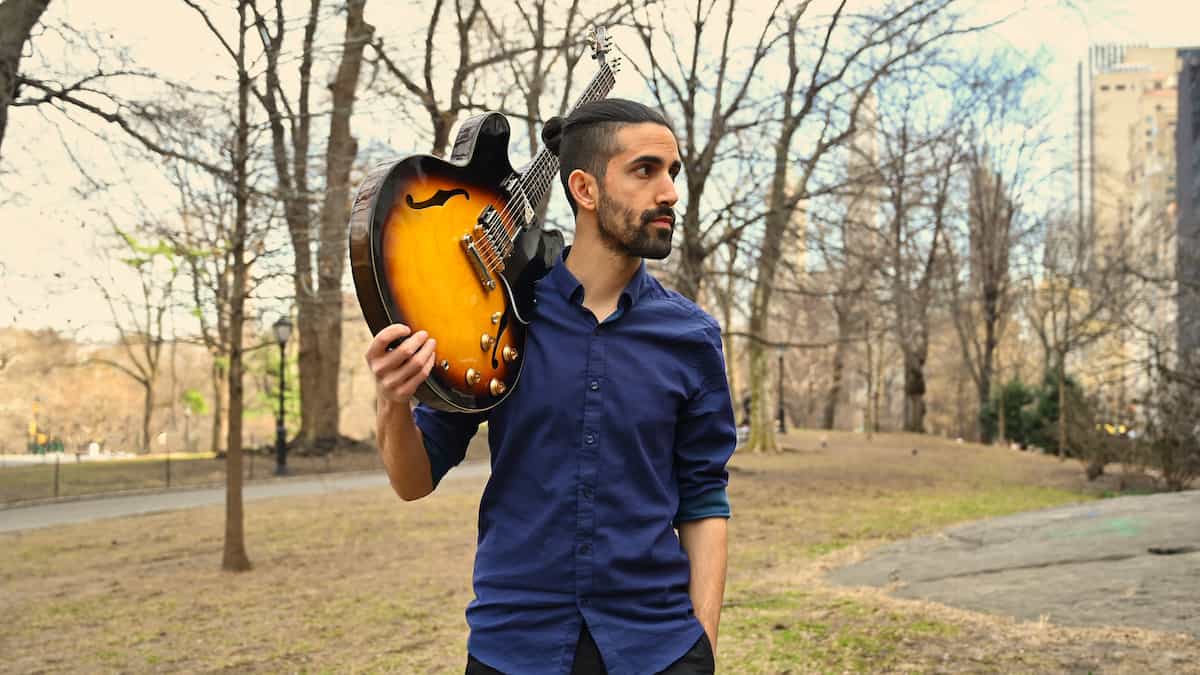Artist Features
Israeli Guitarist Tomer Cohen Talks to JGT About His New Album

JGT contributor Joe Barth interviews a young exciting Israeli jazz guitarist, Tomer Cohen.
Tomer Cohen is a fresh twenty-five-year-old guitarist now based in New York City. Growing up in Israel he brings together bebop with elements of the music he heard growing up. He has just released his debut album entitled Not the Same River. I talked to Tomer about how he became who he is and the recording of this album.
JB: I assume you grew up in Israel. What inspired you to play jazz guitar and what was most helpful in your personal development as a guitarist?
TC: Yes, I was raised in a kibbutz (kind of a village) in Israel. Before I got into Jazz, I was always amazed by the way jazz players approached improvisation. Their ability to listen carefully and play in accordance with the other players inspired and intrigued me. I wanted to learn how to improvise with other players as well.
Studying at the Tel-Aviv Conservatory was the most helpful thing in my personal development as a guitarist. I was exposed to several teachers, who taught me various approaches to playing jazz. It broadened my mind.
JB: To you, what are three of the most influential jazz guitar albums and why?
The three jazz guitar albums that most influenced me are:
Joe Pass – Virtuoso
That was the first ever jazz guitar album I listened to. It blew my mind to hear his musical language and technique, along with his ability to present it as a solo guitar.
Kurt Rosenwinkel – The Remedy
This album showed me that it is possible to create different guitar sounds while holding a jazz structure.
Bill Frisell and Thomas Morgan – Small Town
I love all of Frisell’s albums. “Small Town” album is special because it combines jazz-oriented, with pictorial and abstract compositions. In addition, I love the way they play as a guitar & bass duo.
JB: Early on you immersed yourself in the traditional jazz guitar of Charlie Christian, Wes Montgomery, and Pat Martino. Then you turned to more modern players like Pat Metheny and Bill Frisell. These are all great guitar players, but what did Metheny and Frisell inform you of that you didn’t get from the more traditional players?
TC: Metheny and Frisell opened my mind to different guitar sounds that were not common with the more traditional players. They also showed me how to take the traditional language of jazz and make it my own.
JB: Then what did the saxophonist like Charlie Parker, Sonny Rollins, and John Coltrane inform you of that the guitarists didn’t?
TC: These great saxophonists use different ways to build lines and they inspired me to build my own. Playing saxophone requires taking a short break to breathe, which is unnecessary for a guitar player. I was intrigued by these breaks they take and tried to incorporate it into my music, bringing space into it.
JB: Tell us about your goals in making your new album Not the Same River with drummer Obed Calvaire and bassist Matt Penman.
TC: In addition to my main larger goal of creating music, the goal for this specific album was to incorporate my personal life philosophy into my music. Playing with Obed and Matt felt like the right decision, as they bring talent and a unique voice. They are super-musical and always in the moment. I knew we can create together a flowing, pictorial, and reflective music.
JB: What influence does Israeli folk music have in your compositions?
TC: Naturally, growing up in Israel has exposed me to Israeli folk music. I have absorbed it over the years by listening to it and playing it on various occasions. It seems to have an influence that can be seen in some of the harmonic and melodic choices I made.
JB: Talk a little about your right-hand technique of combining a flat-pick with fingerpicking.
TC: I’m using a pick with the thumb and the first finger and then fingerpicking with the other three. I have developed this technique because I wanted to be able to play the chord notes at the same time (like a piano player) and polyrhythms or different parts of the beat on separate notes of the chord.
Most of all, I really try to learn the things that get me excited, things or ideas I can hear in my head, and after that, to figure out how to play them on the guitar. Sometimes, it requires more than just playing with a pick or fingerpicking.
JB: What do you appreciate most about the Gibson guitar you play?
TC: I love my guitar. I mostly appreciate the sounds it creates, which sounds like an electric guitar but deeper and clearer.
JB: Tell us about the amp that you use.
TC: I use a Quilter Labs Tone Block 202 head. It is easy to travel with and it gives a good sound to my guitar no matter where we play.
JB: As a gigging musician, talk about the jazz scene in Israel when you are there.
TC: The Israeli jazz scene is pretty small. We have two main places where every night we play jazz and hang out. In addition, there are a few smaller venues to play (not on a daily basis), along with the famous Jazz festival – Red Sea Jazz Festival.
Subscribe to Jazz Guitar Today – it’s FREE!
-
Jazz Guitar Lessons2 weeks ago
New JGT Guitar Lesson: Analyzing “Without A Song”
-
Jazz Guitar Lessons4 weeks ago
New JGT Guitar Lesson: Considering “Falling Grace”
-
Artist Features1 week ago
New Kurt Rosenwinkel JGT Video Podcast – July 2024
-
Artist Features2 weeks ago
JGT Talks To Seattle’s Michael Eskenazi



















